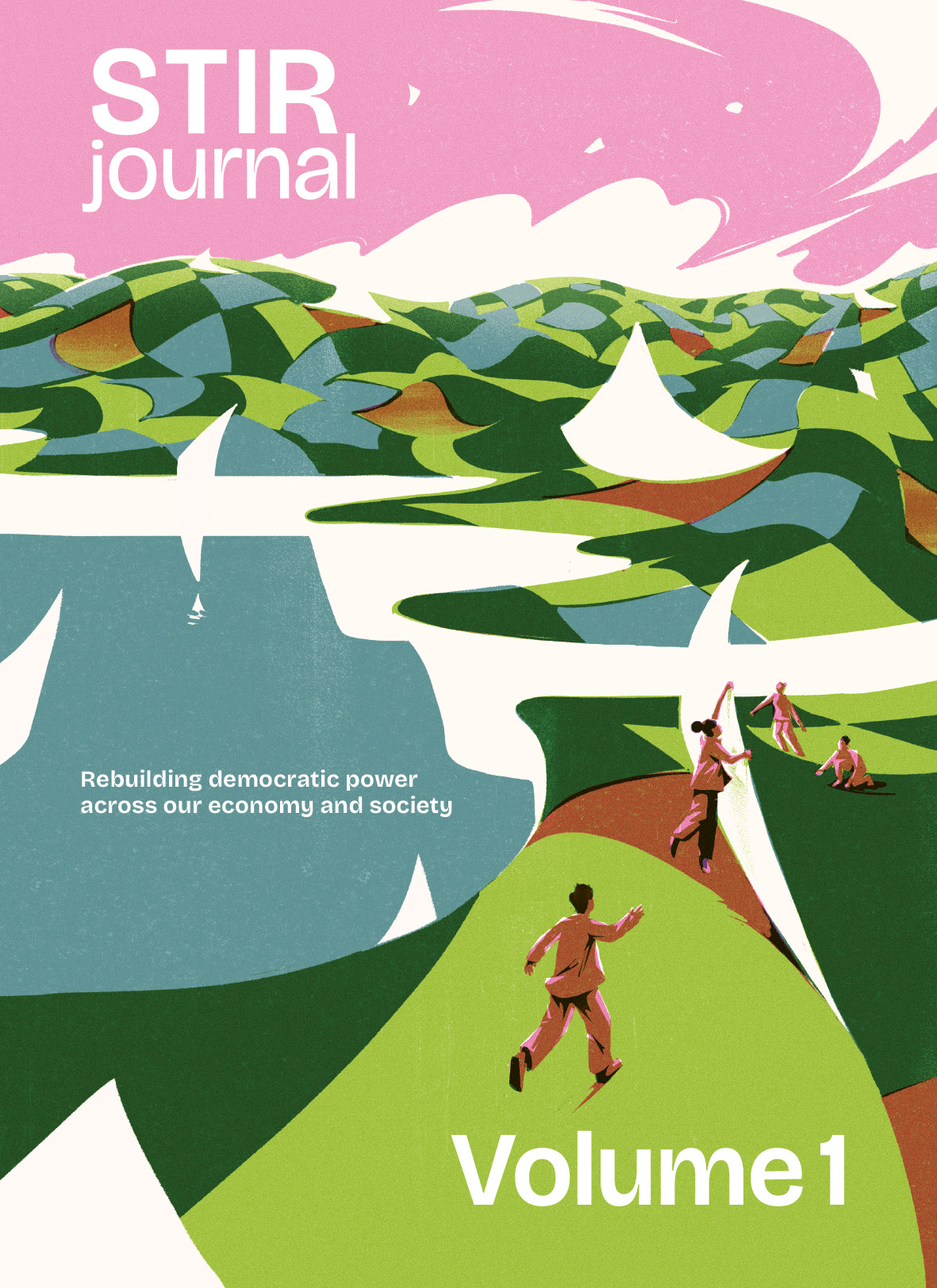.png)
How community property portfolios build local power & wealth
Take a walk through Braunstone, an area woven with social housing on the edge of West Leicester, and you’ll soon spot the neighbourhood’s gathering spaces.
An award-winning health and social care centre is buzzing with activity; an energy-efficient community hub comes alive with library visitors and adult education classes. You’ll find a well-used foodbank and pantry, and an affordable ‘pre-loved’ second hand shop in a former post office. A cluster of small businesses and social enterprises share a large hub with a dance academy, as kids spill in and out of the football pitch.
None of these arrived through a private developer’s masterplan. The patchwork has been assembled over 25 years by b inspired: a charity and community anchor that stewards a dozen buildings in and around Braunstone.
Over this time, they’ve gradually transformed derelict or underused assets into a neighbourhood-scale community property portfolio: a web of spaces making local life thriving and affordable, incubating community businesses and reinvesting profits locally. They’ve revived 12 properties, unlocking affordable workspace for 50 small businesses, activities for thousands of residents, and quality, affordable housing for four families. Many of these assets were transferred from the city council or negotiated at below-market sale prices, then painstakingly retrofitted through patient fundraising, each building becoming a catalyst for the next.
.png)
In an area long ranked highly on deprivation indices, b inspired’s story began in the early 2000s with the New Deal for Communities programme. But its longevity comes from the people, like CEO Angie Wright, who refused to let that decade of investment evaporate and worked to reverse the decline signalled by boarded-up shops, empty council buildings, and disappearing local services. As Angie says, “When buildings are neglected, it makes it look and feel like there’s no creativity or potential in the neighbourhood. But there absolutely is.”
This is what it looks like when a community begins to own and shape its own land and buildings for the long term. And it’s not an isolated story…
In London, Stour Trust is acquiring and transforming spaces in gentrifying Hackney, Tower Hamlets, and Southwark, where community organisations are being priced out and long-standing cultural venues evicted overnight. Founder Juliet Can and team have secured multiple virtual freehold leases, including a peppercorn lease of 999 years. That model, says Juliet, “secures affordability for communities in perpetuity, ensuring life-affirming infrastructures continue to exist outside of the market economy.”
Across England, this movement for community asset development is growing. Local leaders are taking on not one, but several, buildings – and turning them into long-term tools for economic justice, social infrastructure and ecological resilience.
So, what does it take to start the journey from one precarious lease, or no space at all, to a portfolio that transforms a neighbourhood?
1/ Build your partnership
The groundwork is relational. Trace back the origin stories of various community property portfolios and what do you find? Conversations. Coalitions. People coming together around at-risk community spaces, threatened venues and new developments. Or sharing experiences of racial and spatial injustice, or local responses to climate and housing pressures. You also find local authorities and developers wanting to do regeneration differently.
In Darnall Ward in Sheffield, home to a large migrant community, a coalition is taking form. A number of properties have sat empty or underused for years: from an old B&Q to a historic pub, as well as civic spaces. The neighbourhood is shaped by long-term underinvestment, industrial pollution and a critical shortage of social infrastructure.
“[This is] putting the health of the Global Majority at risk for the economic benefit of people who don’t live locally. I believe these communities are best placed to begin reopening the doors of high street shops and landmark buildings, with local people making decisions,” says Kisha Bradley from Sheffield-born social enterprise Brightbox.
Brightbox is convening a group of local residents and organisations with experience of spatial injustice to “decentralis[e] power and financial flow”. They’ll co-shape an alternative vision, collaborating with Sheffield City Council and select private asset owners.
With new core funding from the National Lottery Community Fund (as part of Platform Places’ pilot Local Property Partnerships programme), the group is negotiating its first two buildings and ensuring local underrepresented people have a seat at the table. Kisha says that the funding has been “transformational”: “We’re now able to think and act long-term.”
In Liverpool City Region, Kindred LCR commissioned research from University of Liverpool finding that 70% of the city region’s socially-trading organisations (STOs) cite a lack of secure, affordable space as a key barrier to viability or growth. In response, Kindred has been collectivising: convening STOs and making the case to the Combined Authority to shift funds to this sector. Through the Local Property Partnerships programme and in collaboration with St Helens Metropolitan Borough Council, they’ve secured, and are now activating, the “Street and a Half”: a row of spaces being reimagined with social impact and creative organisations, with a view to a 30-year lease. As Erika Rushton from Kindred puts it, “Clustering STOs means greater impact.”
2/ Secure funds
Even the strongest partnerships need money, and rarely does it arrive all at once. Funding tends to be a story of careful layering, with three broad areas:
- Pre-development costs — to resource a small local team to build partnerships, undertake feasibility studies and develop business models.
- Capital costs — for building acquisition, retrofit and refurbishment.
- Revenue costs — for programming and marketing spaces.
(Visit the ‘Resources’ section of the Platform Places website for examples of funders)
Wandsworth Town Property Partnership began with a £10,000 grant from the local council, followed by £30,000 in further seed funding from Legal & General. By convening stakeholders over a joyful dinner and mapping who owns Wandsworth Town, they started co-creating a new vision and strategy for local regeneration. This early groundwork led to a National Lottery Community Fund grant, alongside Kindred and Brightbox.
b inspired shows what layered funding can achieve. Over time, their growing portfolio has made them largely self-sufficient, with around 60% of income coming from trading, space hire, and housing, enabling them to offer affordable space to small businesses and avoid hand-to-mouth grant cycles. Their trading company’s surplus flows back into the charity, which owns the buildings.
Getting governance right is vital in order to raise funds and hold the lease or freehold. Legal entity options range from CICs to CIOs to Community Benefit Societies, but a single entity can rarely hold all the risks, assets, and funding streams across multiple properties. Hastings Commons has developed a governance ‘stack’ of four different organisations working in consortium: a social enterprise company limited by shares, a charitable CBS, a registered charity and a subsidiary housing body. Expert advice is important to find the right model(s) for your organisation (look for pro bono support or funding to cover this).
3/ Negotiate your first space
Bedminster Works in South Bristol (another pilot Local Property Partnership) is mapping and matching a network of spaces with community organisations, enabling feasibility studies and securing high street homes for groups like Share Bristol: Library of Things. They’ve researched local ownership, selected strategic properties, and begun convening public and private landlords through different tactics. James Perrott from Bedminster Works notes that the area is experiencing “significant gentrification pressures", so acting quickly is crucial, “before buildings are lost to mainstream development.”
Planning obligations can help. Stour Trust partnered with a housing developer through a Section 106 (a planning condition requiring developers to contribute to community infrastructure) to secure their 999-year peppercorn lease, double the size of their original space. Wandsworth Town Property Partnership recently agreed a ten-year social value lease with a local developer (a template Heads of Terms is available on the Platform Places website).
At b inspired, the key was not just persuading the council to transfer assets but shaping the terms of that transfer: pushing back on clauses that banned subletting and insisting on longer leases to more easily unlock funding. CEO Angie explains that the process gets easier each time: “Now we’ve got that foundation of trust, councils and funders can see you’re serious.”




.jpg)
.jpg)









